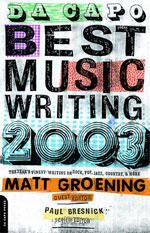
|
Writing about music is always problematic, it seems
to me. At worst there are celebrity interviews which avoid the music and would
rather discuss an artist's sex life or the equipment they use; closely followed
by the simply dull review, which tries to non-judgementally tell us 'the facts'
about the new release: x tracks,
each y minutes long, with these instruments and this kind of lyric.
Or writing gets used to fulfil some author's or publication's stance or attitude.
I made the mistake this week of buying two magazines I don't normally and both
seemed to be suffering from attitude syndrome. Careless Talk Costs Lives thinks
rock & roll is about rebellion and attitude rather than music, Straight
No Chaser - when you can find any writing inbetween the adverts - thinks
music is a style accessory. Both magazines failed because they didn't make me
want to hear anything they were writing about, live or on CD. Both magazines
assume everyone already knows about whatever they choose to feature or review,
both seem trapped in a particular ghetto, which in this day and age seems even
sillier than it ever was. Not that everyone should like everything, but with
access to music via the web, mail order, record shops, radio, cable and satellite
TV, etc etc, there's never been an easier time to make and release music, nor
to hear it. Boundaries between musical genres blurred a long time ago, and to
deny this eclecticism and the musical possibilities it offers seems like burying
your head in the sand.
But even Wire magazine, bastion of 'adventures in modern music' of
all sorts, has recently been succumbing to another writing-about-music disease,
namely the hunt to find the next big thing. Only, of course, for the Wire that
means the next big obscure thing, the stranger and more unlistenable the better,
preferably with some 'ethnic' or 'world' twist involved. And hopefully put out
by a CD company that either doesn't exist or is so obscure you have to phone
an independent record shop in Mid West America or Tokyo to order a copy. I mention
that because recently I was given one of the most exciting CDs I've heard for
a long time, and when I muttered something to the giver about having never heard
of them he said 'didn't you read the review in last month's Wire ?'
I hadn't. I'd started to read about Animal Collective's spirit
they're gone spirit they've vanished/Danse Manatee [which is actually a
Fat Cat reissue of two obscure releases] but given up. The writing was dull [still
is; I pulled the review out to find out why I'd missed it] and it pressed all
the wrong points of reference for me: Syd Barrett, Rupert Bear and Mercury Rev
didn't strike me as a good mix.
Whilst I can see two of these points of comparison [Rupert Bear eludes me],
it doesn't make me want to rush out and buy anything... But then of course
the points of comparison I'm about to offer may make you squirm and flick to
another article. I'd offer early Suicide or Can, even very early Tangerine
Dream as a reference to the squiggly, almost childlike electronics on here;
ATV or The Slits, even Laika or Pram, for the naive, almost childlike, enthusiasm
and playfulness at work; and I'm not sure what for the overall effect.
It's actually what I hoped the recent David Sylvian would sound like: awkward,
strange and occasionally brilliant. Nothing is smoothed down or hidden by lush
production; everything seems laid bare, everything is in high contrast dayglo
colour [including the cover]. If I had a worry it would be that you can't keep
this level of naivety up for very long; if you play your instruments its almost
impossible to not learn some way of playing; if you start to understand how your
quirky songs work then they start to sound like imitations of yourself... and,
hey presto, you're in a rut. But I wish them well, and wish them better reviews
than this or the Wire .
The Da Capo Best Music Writing 2003 - or any of the previous three
editions - would be a good place for writers to start looking at how writing
about music can work. For the writing in here is pretty much exceptional. It
engages with a huge array of types of music, gives information out, expresses
opinions, and most of all enthuses or criticises so well you want to check the
stuff out for yourself. I mean, the opening piece here is about Van Halen, a
kind of fictional historical overview of the band and their reception - or lack
of - in the States, that made me [momentarily, I assure you] want to rush out
and listen to them. Now, beyond their single 'Jump' I had no knowledge of this
band at all; suddenly I'm caught up by someone's argument and enthusiasm; suddenly
the band are on my radar.
And the same thing happens time and time again. Post-war jazz, James Brown,
N.W.A., Tom Waits, even Morrissey: the same thing happens. Someone loves this
stuff, and offers their knowledge and passion to the reader. I want to hear
it, I feel I know something about this stuff now, I feel empowered and knowledgeable.
Elsewhere there's a hilarious satirical piece from The Onion , a gem
of an article about a Parisian record store and its 26 year history, and Elvis
Costello's personal 24 hour jukebox.
This is what music writing should be like; this proves it can still
be done. It proves that you can write intelligently, wittily, amusingly, informative
and opinionated prose about all sorts of music. I'm relieved actually, I was
wondering if it was me getting even older and grumpier. This book suggests
it's not, and that if I hunt hard there's still good music and good writing
about it to be found.
© Rupert
Loydell 2003
|
